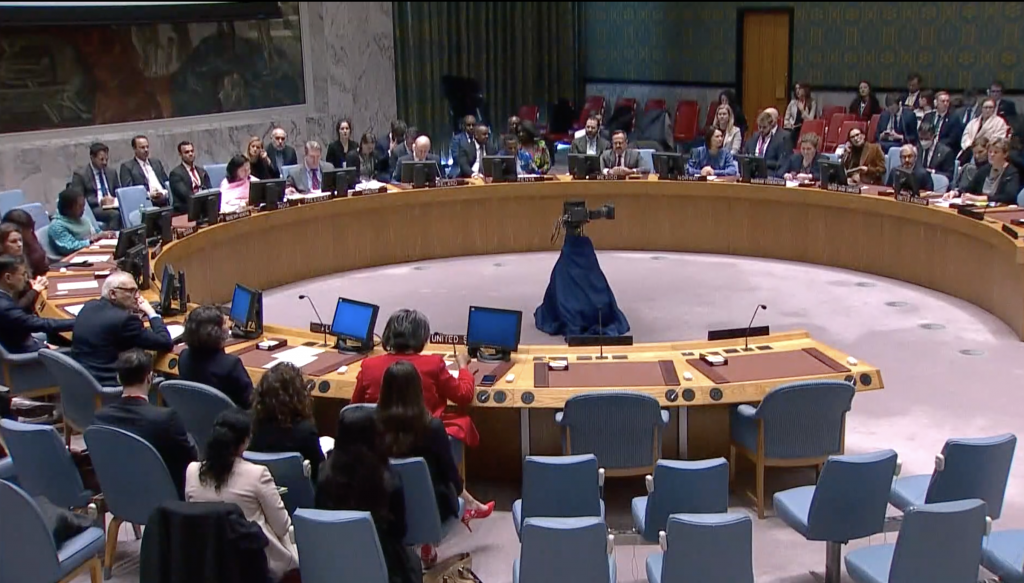Explanation of vote by Deputy Permanent Representative Anna Evstigneeva after the UNSC vote on a draft resolution on humanitarian exemptions
Mme.President,
Russia voted in support of UNSC resolution on humanitarian exemptions from asset freezes to facilitate humanitarian assistance.
Sanctions of the Security Council is one of the strongest reactions to threats to peace and security, which is why this measure needs to be used with caution, be well-grounded and well-calibrated. Use of sanctions as a punitive tool is unacceptable. Sanctions need to be reflective of country situations in which they are applied, and should promote political process.
Unfortunately, the Security Council has not always been able to follow these approaches. This has to do i.a. with the Council’s increased “keenness” on sanctions, which is to a large extent induced by Western states. By our estimates, many of today’s sanctions regimes, i.a. in Sudan, the DRC, CAR, South Sudan, Somalia, do not correspond to the de facto situation in host countries, and hinder plans of national governments in the area of state-building and socio-economic development.
We regret that the issue of humanitarian exemptions has assumed such popularity. In the best-case scenario, UNSC restrictions should not have any bearing on the humanitarian aid, which should always be provided in accordance with UN principles of humanitarian assistance and in close coordination with legitimate governments. But this is not always the case.
We advocate for a holistic approach to this issue. If we have to pass a decision on humanitarian exemptions, we believe those exemptioins must work without impediments and be free from politicized narrative of certain states. Humanitarian resolution 2615 is a vivid demonstration of timely steps that Security Council adopted to extend humanitarian assistance to Afghanistan via all available channels without delay or reference to the sanctions.
We repeatedly called on our colleagues to think of ways to minimize extensive interpretation of sanction-setting provisions, i.a. by means of terminological adjustment, and to carry out an impartial assessment of humanitarian implications of international restrictions. We spoke about it in detail at the key multilateral platforms, including the flagship event of Russia’s Presidency in the Security Council in February this year.
It is reassuring that our repeated calls were finally heeded by those, who had put off addressing this problem for many years citing various pretext. Speaking of ourselves, we have adopted a constructive approach to this issue from the very start of the negotiations.
The resolution that we adopted today includes Russia-proposed provisions about the importance of assessing possible humanitarian implications before the Security Council passes a decision to introduce sanctions regimes, readiness to carry out sanctions reviews, adjust and terminate sanctions regimes if needed, and also about the need for sanctions to be temporary. The resolution also requests the Secretary-General to prepare a written report about the unintended negative humanitarian consequences of Security Council's sanctions.
As for the use of humanitarian exemptions against the backdrop of 1267 sanctions regime for ISIL and Al-Qaida, which is exceptional by its nature, we proceeded from the importance of monitoring of the implementation of the resolution by UNSC Committee 1267/1989/2253 in order to prevent the humanitarian aid from ending up in the hands of terrorists and also to preclude activities of unverified organizations on the ground.
At the same time, the issue of so-called secondary unilateral sanctions that are imposed in addition to UNSC restructions was left outsiude the resolution framework. However those unilateral sanctions constitute a serious impediment for full-fledged functioning of humanitarian exemptions. Fearing strict national or even extraterritorial restrictions, the contractors refuse to purchase UNSC-approved humanitarian assistance, and transportation operators refuse to deliver it. Besides, there occur problems with freight insurance, and banks claim unable to process the money transactions. All these difficulties are characteristic of the DPRK situation. Secondary sanctions of major Western states create the “toxic environment" around Pyongyang and explain why contractors are not ready to engage with North Korea even in the areas that are not affected by the international restrictions.
The resolution that we adopted today did not envisage any solution to this problem, which is a serious shortcoming and another manifestation of the hypocrisy which costs lives and well-being of ordinary people. But this no longer surprises us, if we recall what national policies are implemented in the states that authored today’s resolution.
We are convinced that the only legitimate sanctions are those that are imposed by the Security Council. When states or groups of states introduce unilateral coercive measures, they encroach on the prerogatives of the Security Council and undermine the norms and institutions of the international law. Extraterritorial use of sanctions defies basic norms of international legitimacy. But what’s there to talk about, if Western states became so fixated on sanctions against Russia (including our agricultural and fertilizer exports) that they are prepared to destabilize global food and energy markets and disrupt all effective supply chains.
For our part, we will remain focused on the issue of unilateral restrictive measures, and will gather the global pool of opponents of such policy which exacerbates humanitarian situation in many countries.
In conclusion, let me stress that the area of application of today’s resolution is rather limited. It does not solve many of the outstanding problems related to the usage of UNSC sanctions. However if it helps humanitarian workers to provide more effective assistance to the most vulnerable groups of the population in some country-specific situations, this will already be a worthy result.
Thank you.
